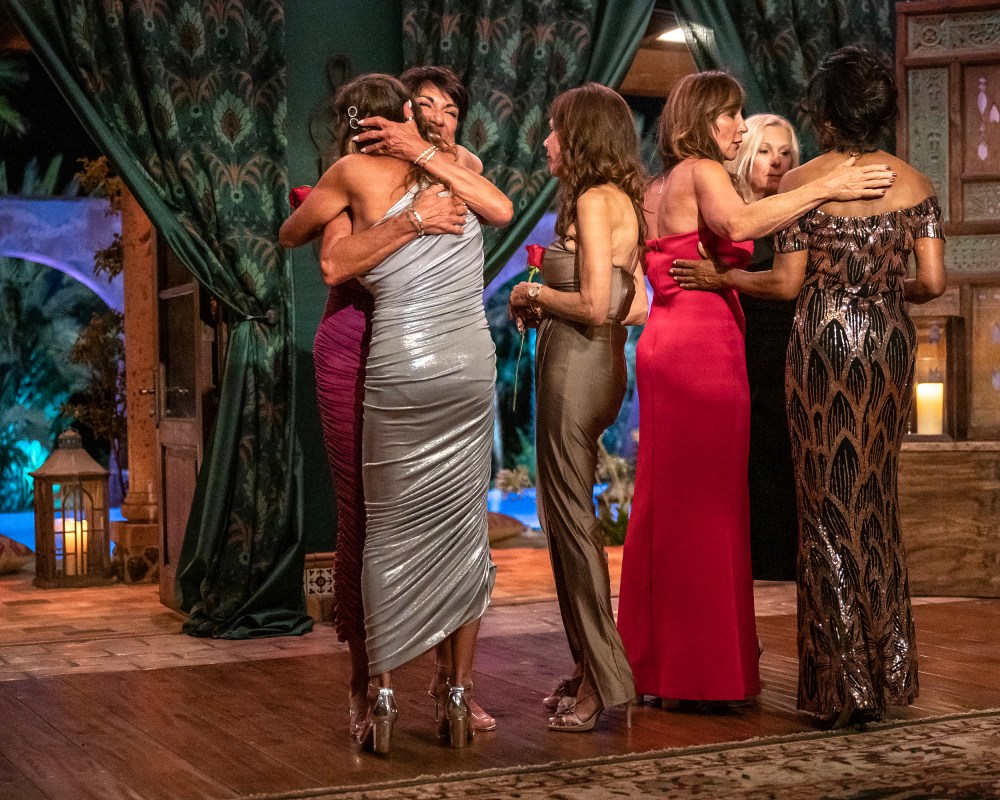UPDATE (Dec. 1, 2023 10:00 a.m. E.T.): This piece has been updated to reflect Turner’s choice on Thursday. He proposed to Theresa Nist.
There’s a moment from the first season of “The Golden Bachelor” that I can’t get out of my head.
In episode five, 72-year-old “Bachelor” Gerry Turner must cull the group of women vying for his heart from six to three. He stands in front of them, eyes welling with tears, and ultimately gifts the final rose of the night to the petite, 70-year-old brunette Theresa Nist.
It’s the reaction of Leslie Fhima, however, the 64-year-old former professional dancer who will also vie for Turner’s heart in Thursday night’s season finale, that stuck with me. When Fhima realizes that her friend Ellen Goltzer is being eliminated, she slides closer to Ellen and gently leans her head on the other woman’s shoulder. The camera immediately pans away, following Nist as she weepily accepts Turner’s rose, but it’s that moment of tenderness between Fhima and Goltzer that burrowed its way into my heart.
It’s the reaction of Leslie Fhima, however, the 64-year-old former professional dancer who will also vie for Turner’s heart in Thursday night’s season finale, that stuck with me.
Anyone who watches reality television is familiar with the trope that cast members on competition shows — even if that competition is for love — “aren’t there to make friends.” But the women of “The Golden Bachelor” seemed there for love and friendship. And those of us who tuned in week after week were there to watch them search — for companionship, for friendship, for the right to be seen and heard and valued — whether or not they ended up with Turner, a man whose on-screen persona can best be described as an AI-generated, Sensitive Midwesterner Ken doll.
Watching “The Golden Bachelor” has been an experience rife with joy. Where past seasons of “The Bachelor” have leaned into conflict and reduced the women to unflattering, flattening tropes, “Golden” flips the script and embraces complexity.
The most heated the drama gets is when Kathy Swarts tells Nist to “zip it” when the latter overshares the lovey-dovey details of her burgeoning romance with Turner. But moments of platonic connection are frequent and dynamic: Susan Noles holds Goltzer as she cries during a group date at an amusement park. Goltzer, Fhima, Nist and Noles sing “Hava Nagila” and do the hora in the show’s sprawling mansion pool. Swarts, Noles, Nancy Hulkower, Faith Martin, Sandra Mason and April Kirkwood play a raucous game of “Never Have I Ever” with pints of ice cream instead of red solo cups full of liquor. When Joan Vassos has to leave the show early to help a daughter struggling with postpartum depression, the other women are devastated on her behalf.
During the reunion episode, where rejected cast members come back together ahead of the finale, it was apparent that this cast was united by a shared sense of purpose; a feeling that they were all engaged in an important, collective process. Swarts said that in her mind the show is, yes, “about love. But it’s also about hope and friendship and what life offers all of us.”
For journalist and author Lisa Belkin, “The Golden Bachelor” is captivating precisely because it allows moments of human connection that have nothing to do with the romantic lead to shine through. It’s a show about “how real people process love, grief, intimacy, uncertainty, rejection,” Belkin told me. “And one [element of that] is friendship.”
I don’t want to overstate the subversiveness of “The Golden Bachelor.” It is still, at its core, a conservative, hetero, marriage show. And Turner, according to a recent Hollywood Reporter piece, is not such a folksy saint. But what makes “Golden” different from its predecessors in the franchise is that it is telling stories that are genuinely underrepresented.












